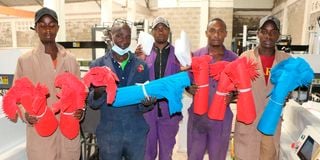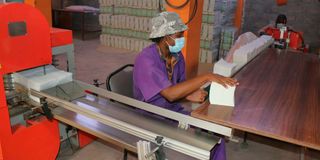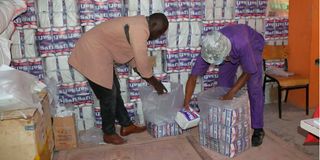Premium
This business saw golden chance in carrier bag trade

Workers at Royal Eco-Bags Limited in Nakuru County display some of the finished echo-bags.
What you need to know:
- Royal Eco-Bags Limited is a trailblazer in the production of non-woven carrier bags and serviettes.
- Their dedication to innovation and sustainability has positioned them as a leader in the industry.
In 2017, Kenya implemented a landmark ban on single-use plastic bags, a pivotal step in the country's drive to combat plastic pollution and foster sustainable practices.
This regulatory action not only underscored Kenya's commitment to environmental conservation but also presented a significant challenge and opportunity for businesses.
Embracing the ban as a catalyst for change, Royal Eco-Bags Limited in Sobea, Nakuru County, has become a trailblazer in the production of biodegradable alternatives, specialising in non-woven carrier bags and serviettes.
Their dedication to innovation and sustainability has not only positioned them as a leader in the industry but also exemplifies how businesses can align with regulatory mandates to drive positive environmental impact while fostering economic growth.

John Mwaura displays some of the echo-bags he manufactures in his industry located at Sobea in Nakuru County.
Dan Mwaura oversees the family business in his role as general manager. A teacher by profession with a Bachelor's Degree from the University of Nairobi, he pursued further studies abroad at Masaryk University in the Czech Republic and is currently completing his Master's Degree in Education at Kenyatta University.
He attributes their inspiration for starting the company to a profound concern for the environment. His motivation stems from a desire to mitigate the detrimental impacts of plastic waste by manufacturing alternatives.
“When Kenya implemented a ban on single-use plastic bags, I was completing my studies at Masaryk University and contemplating my future upon returning to Kenya, knowing that finding employment would be challenging,” says Mr Mwaura, adding that this led him to conduct extensive research online on the production process of non-woven bags, including sourcing machinery and raw materials, as well as understanding the importation procedures to Kenya.
After gathering all the necessary information, he travelled to China, where he purchased the required machinery and raw materials, and in 2019, he commenced production of these bags.
In its nascent stages, Royal Eco-Bags Limited Directors raised an initial funding total of approximately Sh5 million, consisting of Sh3 million obtained through a bank loan and the remaining Sh2 million raised from their savings. This capital was crucial for acquiring raw materials, equipment purchases, and initial marketing efforts.
The journey towards establishing credibility in the biodegradable products industry involved obtaining regulatory approvals and certifications. These approvals have not only validated the company's commitment to sustainability but also opened doors to partnerships and collaborations with like-minded organisations.
“To produce non-woven bags, obtaining KEBS certification is essential. Additionally, a NEMA certificate is required because paper napkins and serviettes must be packaged in a plastic bag. A county business permit is necessary for your business premises, along with a distribution permit for each county where you plan to market and sell your products," he explains.

A worker operates a machine that manufactures serviette at Royal Eco-Bags Limited in Sobea, Nakuru County .
Since its inception, Royal Eco-Bags Limited has successfully catured the attention of environmentally conscious consumers, businesses seeking sustainable alternatives, and government entities promoting eco-friendly policies.
“Raw materials for non-woven bags are fabric rolls, processed on-site through folding, sealing, and cutting to shape. Napkins and serviettes use paper reels that are embossed, folded, and cut into squares by dedicated machinery. Finished napkins are packed into packets and then bundled into bales for distribution,” he says.
At the heart of Royal Eco-Bags Limited's success is its dedicated team of 25 employees, consisting of skilled individuals who serve as supervisors, machine operators, a secretary, and an accountant, alongside semi-skilled workers who handle tasks such as packaging, loading, and offloading.
“Our commitment to producing high-quality products is maintained by closely monitoring the production process to ensure each non-woven bag and paper napkin meets rigorous standards. Both our non-woven bags and paper napkins are designed to disintegrate easily when exposed to moisture and various climatic conditions,” he says, adding that their bags are highly durable and can be reused multiple times.
Additionally, used bags can undergo recycling to produce polypropylene pellets, which are subsequently used in manufacturing bag fabric. The primary mission of Royal Eco-Bags Ltd. is to tackle urgent environmental issues through innovative solutions.
“Our focus on non-woven bags and serviettes stems from acknowledging the significant environmental consequences of traditional plastics. We are committed to contributing to environmental conservation and nation-building by generating employment and promoting locally manufactured goods, “he says.
In a competitive market, success hinges not only on innovative products but also on a distinctive selling proposition.

Workers inspect finished packs of serviette at Royal Eco-Bags Limited in Sobea, Nakuru County.
According to Mr Mwaura, what distinguishes Royal Eco-Bags Limited is its commitment to producing high-quality products, meticulously ensuring that every bag and serviette meets exacting standards through rigorous oversight of the production process.
“Our prices are competitive and affordable, offering products that fulfill specific needs and purposes for our customers. Prices vary based on bag size and design; for instance, the large-size bag is priced at Sh3,100 per bale of 500 pieces, while serviettes cost Sh1,250 per bale of 18 packets.”
Mr Mwaura admits that the entrepreneurial journey he describes has not been without its challenges. Challenges faced, such as market competition and supply chain complexities, have been met with resilience and have provided valuable insights that have shaped the company's growth trajectory.
In addition to profitability, Royal Eco-Bags Limited defines its success by the tangible benefits it brings to society and the environment. This includes reducing plastic waste in landfills, supporting local economies through sustainable practices, and fostering employment opportunities.
“Looking ahead, we envision continuing our commitment to producing environmentally friendly products. We are grateful for the support of our banking partners and the Government of Kenya, particularly Kenya Industrial Estate (KIE), who have been instrumental in supporting our business. Additionally, we plan to extend our market presence to neighbouring countries,” he says.
Royal Eco-Bags Limited is dedicated to advancing sustainability and establishing new benchmarks in the biodegradable products sector. Through ongoing innovation in eco-friendly solutions, the company asserts itself as a leader in this field.
Maintaining rigorous standards in product quality and environmental stewardship, the company aims to expand its market presence.
Looking ahead, the company remains committed to partnering with both the governmental and private sectors to further its goal of minimising plastic waste and promoting local manufacturing.
Royal Eco-Bags Limited exemplifies the synergy of entrepreneurial vision and steadfast environmental stewardship, yielding profound influence.
“Our endeavours underscore the transformative power of environmental responsibility in fostering economic prosperity and societal welfare and shaping a sustainable future. As the world confronts environmental complexities, we illuminate the harmonious coexistence of profitability and sustainability, paving the way towards a cleaner, greener future,” he concludes.





